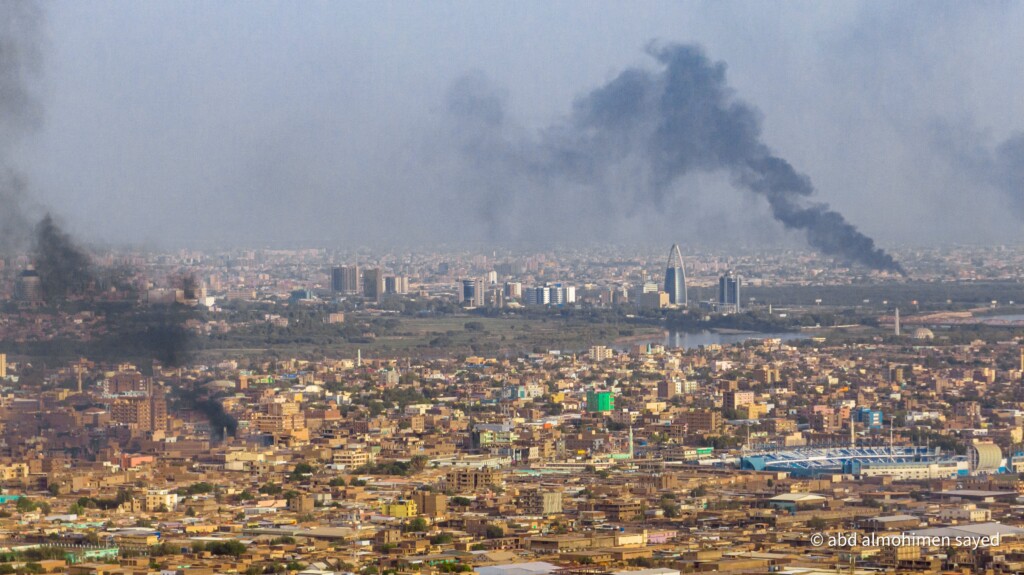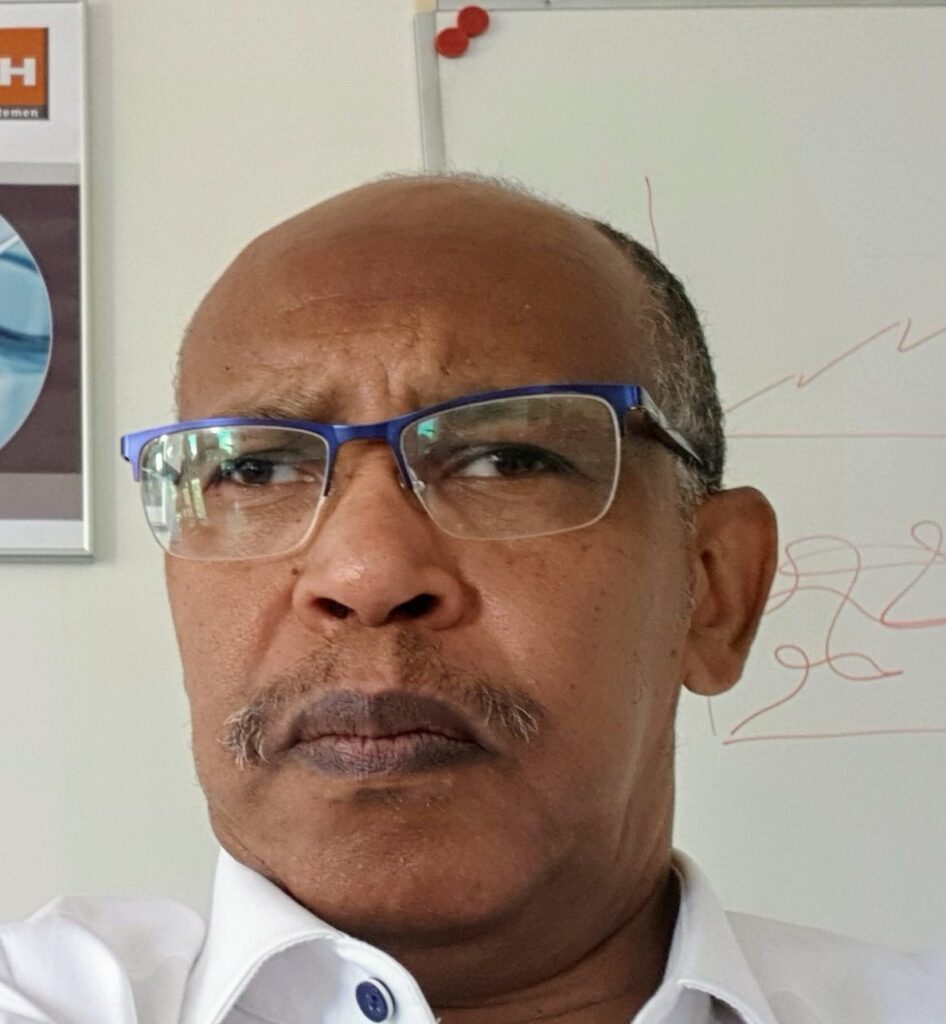The complexities of standing behind the SAF in the Sudan war and the risks of a RSF victory

Columns of smoke rise above Khartoum - May 27, 2023 - Photo by Abdel Mohaimen Sayed (Twitter)
AMSTERDAM – Radio Dabanga broadcast From the Other Side –
Both the Sudanese Armed Forces (SAF) and the paramilitary Rapid Support Forces (RSF), which started fighting each other on the early morning of April 15, 2023, have not witnessed tangible popular enthusiasm and have been met with a kind of coolness on the street. It is the neutral bystander attitude that has been marked by reactions on social media and Sudanese dialogue platforms.
This was marred by a lot of blame for the Sudanese army for being the reason for the expansion of the RSF militia, doubling the number of their personnel and deploying them in many cities in the country, and focusing their presence on the capital, Khartoum, around many strategic places. All this happened at a time when young people from the resistance committees were chanting “the military is for the barracks and the Janjaweed are dissolved,” referring to the RSF paramilitaries that carried out the dirty tasks of the Al Bashir regime for an official part of the regular forces under the law.
More importantly, this war came to block the revolutionary tide demanding democracy and a civil state.
Now that the second month of war is nearing completion, neither side has been able to clearly resolve it in its favour. This is evident from the proportionality of the force on the ground and from the army’s attempts to arm civilians to participate in the fighting to win the battle. Such an attempt would open the door to the expansion and prolongation of the war, and even turning it into a full-scale civil war, which has not happened so far for the reason we have mentioned of the apathy and spectator attitude that limited the alignment that could have occurred behind This or that team.
As the days passed, ranks became more divided and camps were formed, each with a specific position on the war. There are those who believe that supporting the regular army is supporting the backbone of the Sudanese state and warning that its defeat means the disintegration of the state of Sudan in its current form.
A second group believes that the army is controlled by the security apparatus of the Al Bashir regime. Supporting the army means signing a blank paper to move forward with the implementation of the plans of the Islamists who seek by all means to block the way to the people’s revolution in order to restore democracy and a civil state.
A group that believes that the war will continue until the RSF is completely eliminated, describes any neutral position on this war as a betrayal of the homeland because the RSF is a rebel force that must surrender or eliminate its weapons.
Then there are those who believe that the defeat of the army does not mean the disintegration of the state, but the collapse of the old state of independence and the segments that have gained its privileges since that time. What is important is the restoration of the revolution and its desired gains, not the fear of losing a state that once did not do justice to its citizens.
A war that is not in vain
Against this background, a number of those interested in political affairs spoke to Radio Dabanga’s programme “On the Other Hand” about the position of the Sudanese army in this war. One of them is human rights activist El Sadig Eisa, who said that logic dictates that any citizen should support his country’s army in any state of war or conflict. The army in its current form and composition is under the control of the dissolved National Congress Party, and since there is no neutrality towards the issues of the homeland, stopping the war is the cessation that he chooses it in this case.
In addition, the cessation of war must be accompanied by a sitting down to talk about basic issues, not in the sense of negotiating between the various powers to reach a minimum agreement, but to reach an agreement on all basic issues and not to transfer them. He stressed that crucial issues are not solved by a minimum agreement.
With this angle of approach, Eisa did not consider that war is absurd, but rather a moment to arrange the situation and heal the cracks that occurred as a result of the tensions before the war, as happened in other nations and countries throughout history.
Eisa described this war and the destruction it left behind and the innocent victims that fell as a criminal war that must be held accountable and brought to justice. He pointed out that the moment has come to put an end to the kind of negative peace that the country has been witnessing, which hides under its static façade many tensions that quickly explode in the form of a war, once it ends, another war begins after a while.

The army must be supported
Khalid El Tahir, a writer, and defence worker, says it is now necessary to stand behind the army in this war. He added: “No sane person wishes to defeat the Sudanese army, because that means the disintegration of the Sudanese state.”
But he set some conditions for this stand or support for the military institution, which is that it will permanently exit the political and economic arena that it now occupies and represents its main concern.
El Tahir pointed out that a question such as who you are standing with now that we started talking with is a simplistic and confusing question at the same time. He believes that there are many reservations about the army from “the moment the Islamic Front launched its coup in 1989 and the beginning of the formation of army generals for economic and commercial interests and their involvement in smuggling operations.”
He added that the preoccupation of army commanders with these matters made them rely on the RSF for the activities usually carried out by the infantry forces, and even made them carry out the task of guarding army headquarters such as the General Command. El Tahir continues:
“The RSF grew and expanded with the blessing and complicity of army commanders and allowed the numbers of these forces to multiply and grow about ten times compared to the moment of the collapse of the regime of Omar Al Bashir. The increase in numbers was followed by an increase in the equipment and quality of armament owned by these forces. The RSF and the army collectively account for about 70 percent of the state budget for 2021.”
El Tahir explained that Hemedti has a different agenda, which is where the danger lies, as he dreams of what he called the “Republic of the Kadamol” and added conservatively that he is not against the kadamol (a scarf covering the face) as part of the dress or culture, but the dream of establishing this republic is accompanied by living evidence and present represented in tens of thousands of those who extracted the Sudanese national number and they speak French, which is uncharacteristic and French is spoken only by a limited number of intellectuals within the scope of the French Cultural Centre in Khartoum.
“There is a plan for the establishment of a state with an ethnic dimension for those coming from Chad, Cameroon, Mali and Niger extending from the Atlantic to the Red Sea,” he said.
Intervention under Article VII
El Tahir appealed for an immediate end to this war today before tomorrow. He described the combatants as lacking reason, rationality, and the slightest sense of responsibility towards citizens, adding: “I welcome the intervention of the United Nations under Chapter VII.” He pointed out that the responsibility now lies with the international community to intervene to protect.
He stressed that this war carries with it great dangers for the entire region and for the international community. Asked if intervention would work in Sudan after it failed in many countries such as Iraq and Afghanistan, he replied that if there was the political will of the international community, the intervention would succeed and restore peace and stability.
He concluded by lamenting the Sudanese people, who had paid the price twice, “the first time in the process of fattening the RSF monster and the last double price in trying to eradicate this monster”. He said the prices of missiles and bullets now used by both conflicting parties were being paid for by the sweat and blood of the Sudanese people.











 and then
and then